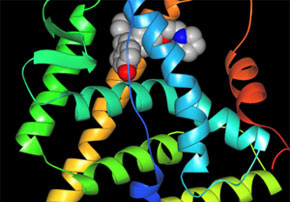

Estrogen stimulates the proliferation of cells responsible for the maintenance of spermatozoid production and can also be related to prostate cancer, say Brazilian researchers
Estrogen stimulates the proliferation of cells responsible for the maintenance of spermatozoid production and can also be related to prostate cancer, say Brazilian researchers.
Estrogen stimulates the proliferation of cells responsible for the maintenance of spermatozoid production and can also be related to prostate cancer, say Brazilian researchers.

Estrogen stimulates the proliferation of cells responsible for the maintenance of spermatozoid production and can also be related to prostate cancer, say Brazilian researchers
By Karina Toledo
Agência FAPESP – A study conducted by Universidade Federal de São Paulo (Unifesp) revealed that the feminine hormone estrogen plays a fundamental role in masculine fertility. The discovery helps to understand some cases of unexplained infertility, which had unknown causes, and paves the way for new treatment.
“The level of estrogen in a man’s bloodstream is lower than circulating levels in women. However, when analyzing the organs of the male reproductive system, the level is much higher than those found in women. We wanted to understand the importance of this hormone in these organs,” explains Catarina Segreti Porto, coordinator of the study, which was funded by FAPESP under the Research Assistance – Thematic Project program.
In analyzing material extracted from the testicles of rats, the researchers discovered the existence of three different estrogen receptors in the cells responsible for the maintenance of spermatozoid production – so-called Sertoli cells.
“The cells only proliferate in a phase of development that occurs before puberty. This process will determine the quantity of sperm that an individual produces in adulthood. The more Sertoli cells, therefore, the greater the number of spermatozoids,” explains Porto.
One of the receptors discovered by the scientists – known in the scientific literature as estrogen receptor alpha – is responsible for stimulating the proliferation of Sertoli cells.
“Some cases of masculine infertility are unrelated to a lack of testosterone, other androgens or their receptors. The explanation for these cases could be flaws in the production of estrogen and the function of this alpha receptor,” says Porto.
The researchers also demonstrated the existence of estrogen receptor beta, which has an antiproliferative function in the Sertoli cells and is expressed in greater quantities in the period that precedes puberty.
The third receptor found is known as GPER and inhibits the process of apoptosis in Sertoli cells, or rather, it is responsible for keeping cells alive.
“This receptor was recently discovered in studies on breast cancer, and there was still no certainty that it was found only in pathological situations. Now, we have shown that it also has a role in the survival of normal cells,” says Porto.
The study was conducted with cells extracted from the testicles of 15-days-old rats, an age at which proliferation begins to diminish.
“In the future, we can think about pharmacological tools that selectively interact with each of these receptors. However, before that, we need to better investigate the expression of these receptors in different phases of animal development and discover when it is possible to intervene to guarantee the normal production of spermatozoids,” said Porto.
The results of this thematic study have culminated in four articles: two published in the Biology of Reproduction, one published in Spermatogenesis and another published in the Arquivos Brasileiros de Endocrinologia e Metabologia.
Prostate Cancer
In another branch of the project coordinated by Porto, the scientists investigated whether the presence of estrogen and its receptors in the masculine reproductive system would have an influence on prostate cancer.
“We know that masculine or androgynous hormones stimulate the proliferation of malignant cells, so much so that one of the main treatments for prostate cancer is surgical or pharmacological castration,” says Porto.
Approximately 85% of the patients with prostate cancer respond well to treatment blocking androgynous hormones, and the tumor stops developing, but 2 or 3 years after the treatment, a significant percentage relapses. “For these cases of castration-resistant cancer, there is no effective treatment. They progress and cause metathesis,” says Porto.
In analyzing the castration-resistant prostate cancer cells, Unifesp researchers found that estrogen receptor alpha and beta were also present.
“We expected to find these receptors because estrogen is also produced in the prostate, but what was surprising was verifying that in cancer cells, these receptors were already located outside the nucleus. In normal cells, more than 90% of the receptors were within the nucleus,” explains the researcher.
When the receptors are outside the cellular nucleus, they become incapable of more quickly activating several cellular signaling pathways involved in proliferation, survival and cellular migration.
“We showed that the activation of the beta receptor leads to an increase in beta-catenin, which has several roles in the development of the tumor. These studies are still underway, but we suggest that estrogen and its receptor could have a role in the progression of castration-resistant prostate cancer,” says Porto.
The preliminary data were presented at the Endocrine Society’s 94th Annual Meeting in Houston, Texas , this past June.
Articles:
- Expression and Signaling of G Protein-Coupled Estrogen Receptor 1 (GPER) in Rat Sertoli Cells: www.biolreprod.org/content/83/2/307.full.pdf+html
- 17Beta-Estradiol Signaling and Regulation of Proliferation and Apoptosis of Rat Sertoli Cells: www.biolreprod.org/content/86/4/108.long
- 17β-estradiol signaling and regulation of Sertoli cell function: www.ncbi.nlm.nih.gov/pmc/articles/PMC3271643/pdf/spmg0104_0318.pdf
- Estrogen receptors and function in the male reproductive system: www.scielo.br/pdf/abem/v53n8/05.pdf
Republish
The Agency FAPESP licenses news via Creative Commons (CC-BY-NC-ND) so that they can be republished free of charge and in a simple way by other digital or printed vehicles. Agência FAPESP must be credited as the source of the content being republished and the name of the reporter (if any) must be attributed. Using the HMTL button below allows compliance with these rules, detailed in Digital Republishing Policy FAPESP.





